Schottee de Vries, Jan.
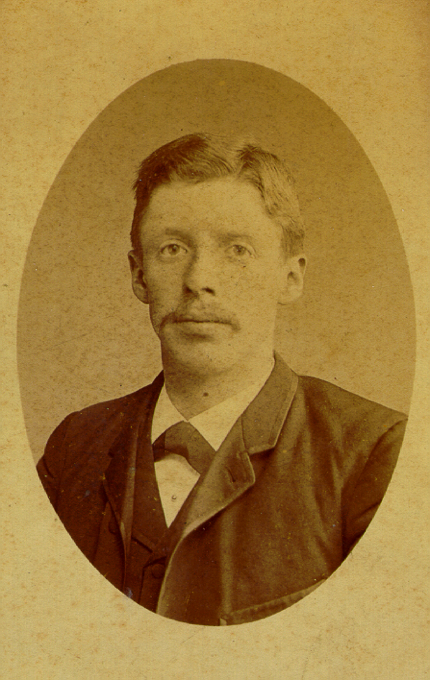
Captain Jan Schottee de Vries. There is no photo known of him in Holland America Line uniform (a)
Name: Schottee de Vries, Jan.
Born: 14 January 1863 at Hoorn
The name Schottee de Vries is a merger of the name of his grandfather Hendrik de Vries (1791 – 1867) and his Grandmother Hillegonda Ewouda Schottee (1798 – 1864). They married on 24 March 1826 and his father is then registered with this double name.
Father Jacob Schottee de Vries (1829 – 1899) and mother Bregje Christina Bos lived in the town of Hoorn where he was a salesman working in the family business.
There were six children and he was number three in the lineup with 2 older brothers and 2 younger brothers and sister.
The family was wellknown in Hoorn as the grandfather owned a business in cheese distribution and sales. He was also on the board of a local charity for disadvantaged children. And he was on the Council of the City of Hoorn. The two eldest sons followed their father in the cheese business and in local politics.
At the age of 14 years old, Jan Schottee was accepted as a pupil at the Kweekschool voor de Zeevaart in Amsterdam on 04 Augustus 1877. By the summer 1881 he was ready to go to sea. (The inventory of the Maritime museum in Amsterdam gives that his school uniform jacket is in their collection (c))
He joins the “Soerabaja” a ship engaged on the service to Java (Dutch East Indies) under the command of a Captain Wielinga on 06 July 1881. He received a monthly wage of 12 guilders. Exactly one year later he returns to school on 06 July 1882 with a very good report.
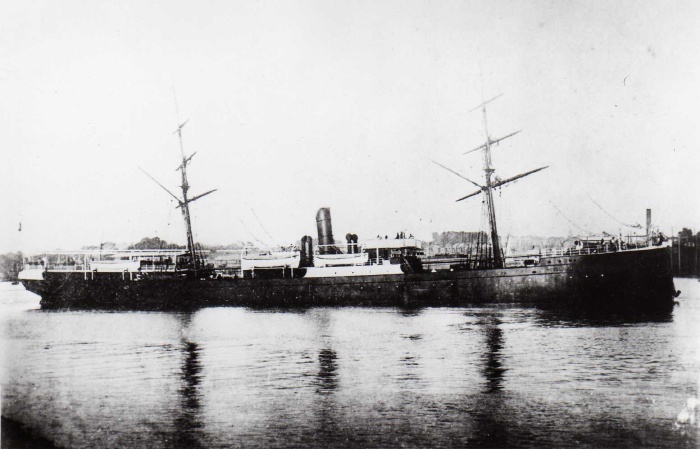
The ss Soerabaja (I) came into service in 1882, for the Rotterdam Lloyd (ED: I believe this is the ship Jan Schottee joined as cadet) (b)
Back at school he passes his 3rd mate certificate for Deep Sea on 21 November 1882. He is discharged with honours from the academy on the same day. His school marks are the highest for shooting and gymnastics. (ED: Shooting and fencing were a standard part of the curriculum as it was not unusual in those days that both skills were needed while sailing around the world)
Then we have a gap in his career as between 1882 and 1887 he sails for another company. He obtains in November 1886 his Chief mates ticket and joins Holland America in January 1887 as a 3rd. Officer.
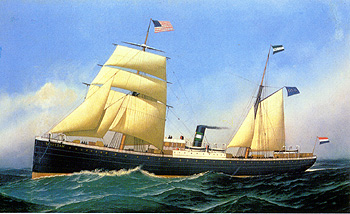
The ss Schiedam I joined Holland America in 1877 and carried 50 First and 200 3rd class passengers. This was his first ship. (The picture is an artist impression which appeared on the HAL menu’s in the early 1990’s) (b)
Because of the fact that he already had his master license (Chief’s Mate obtained in 1886) he manages to get promoted to captain in 3 years time. That is one year for each rank. Based on that it is assumed that he had sailed in a senior position before he came to Holland America Line. In July 1890 he is assigned as captain to the P Caland the 3rd ship built for the company back in 1874. He remains with Holland America Line until 1900 and then asks to be dismissed.
He transfers to the Koninklijke Hollandsche Llloyd or Royal Dutch Lloyd of Amsterdam which was a company that maintained a regular liner service from Amsterdam via the European West coast to the East coast of South America.
Looking at the number of ships and captains with Holland America at that moment he probably did not enjoy and agreed to either having to be on standby or step down in rank to find a ship to sail with. Several of his ships were sailing from Amsterdam and maybe during this period he made some useful contacts that gave his the option to switch.
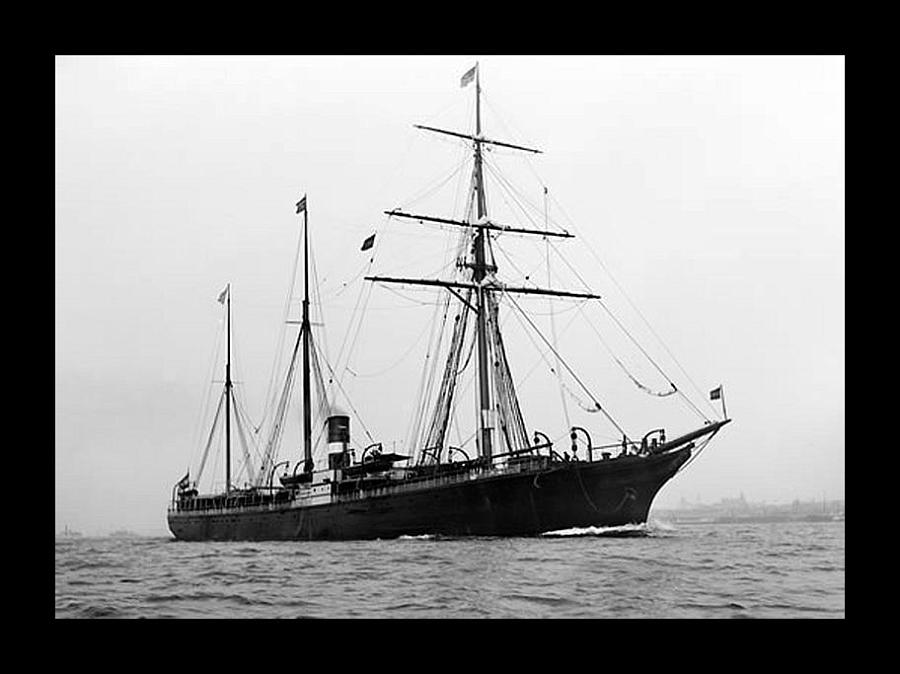
The ss P Caland see here leaving port. This ship was the first ship of the company after it went public in 1873 and was named after the man who widened and deepened the river Maas so deep drafted ships could reach Rotterdam. That part of the river was then renamed “Nieuwe Waterweg” or new Waterway. The first command of Captain Schottee. (b)
There are only sparse records about his period with Holland America. But he was unfortunate to be only a year I command when on 15 April 1891 the P Caland collided with the ss Glamorgan. The newspapers reported that the P Caland was making a fill in voyage and on this return voyage from New York it only had a few passengers on board, including a troop of gypsy’s with a dancing bear, all sailing in the emigrant class. While in the English channel the Chief Engineer reported engine problems and speed was reduced from 12 to 3 knots and two white lights (denoting I can NOT maneuver) were hoisted. In the early evening a red light was observed on the port side and the P Caland kept course and (slow) speed as Red to Red is “perfect safety go ahead”. Suddenly the single red light became a red and green light which indicated that this ship was now heading straight for the bow of the P Caland.
Captain Schottee ordered full astern but even with the slow speed it was making it was too late to avoid a collision and the other ship crashed through the bowsprit of the P Caland whose bow ripped open the Glamorgan and punched a hole in the midships area where the engine room was located. All 34 persons of the Glamorgan including 2 women and 2 children managed to climb over the bow of the P Caland and were thus saved. One hour later the Glamorgan had taken on so much water that the ship wrenched itself free from the P Caland, heeled over and sunk. The P Caland sailed for Dover where everybody was disembarked (including the gypsy’s and the Bear) as the ship had to be repaired before it could continue the voyage. Once temporary repairs had been affected the P Caland could sail with a slow speed to Rotterdam. Here it arrived on Sunday afternoon,and because it was a nice Sunday it caused half the City of Rotterdam (according to an estimate of the local newspapers) to go the shores of the New Waterway to see the “collision boat” coming in. The P Caland returned shortly after back to service with Capt. Schottee in command.
On 15 October 1891 he marries Alida van Waalwijk (29 May 1866 Amsterdam – 25 October 1954 Bussum) in his home town of Hoorn. Eventually there were 4 children of which one, Jacob also went to sea and sailed for the Dutch Blue Funnel Line of Amsterdam.
Children:
1. Brigitta Christina Schottee de Vries born Rotterdam 27 December 1894, passed away 02 Febr. 1975. She married Professor Adriaan Willem Mulock Houwer Eye doctor and Professor in the ophthalmology at Amserdam
2. Alida Adriana Schottee de Vries born Amsterdam 23 June 1896 passed away on at Bussum on 22 July 1977. She was financial attorney and later Vice President of the Insurance office of the Dutch (amalgamated shipping company) Nedlloyd in their Amsterdam office.
3. Jacob Schottee de Vries born at Amsterdam on 15 June 1900 and passed away at Bussum on 15 Oct. 1985. He became Captain with the Steamship Company “Oceaan” of Amsterdam. (This was the Dutch arm of the British Blue Funnel Line. He married on 13 September 1952 Carolina Ludovica Hendrika Engel (born Germiston south Africa) and passed away 234 September 1974 Bussum.
4. Janita Schottee de Vries (born Amsterdam 18 June 1904) who married on 17 March 1931 at Bussum Mr. Barend Stroeve
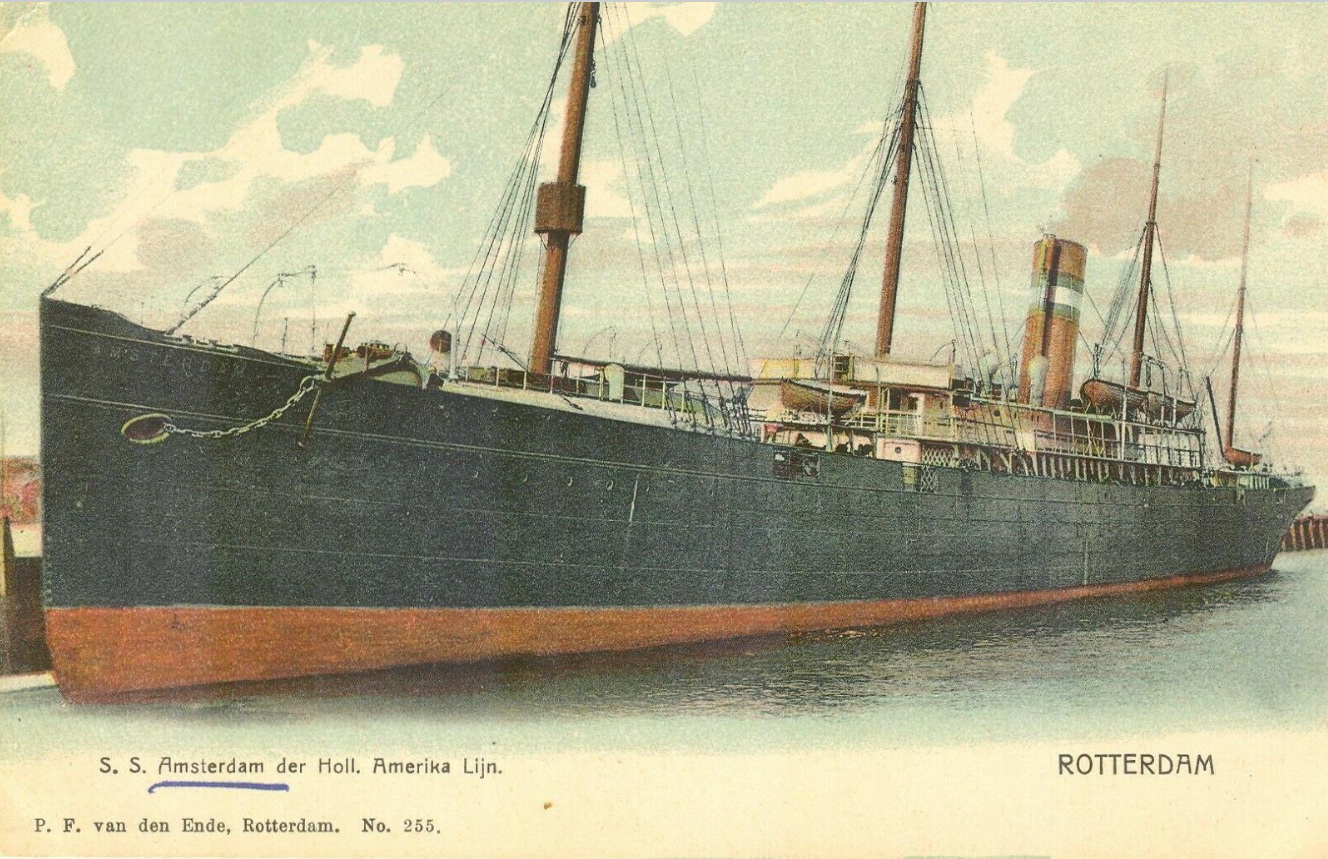
The ss Amsterdam (II) The final command of our command while with HAL. This ship had joined Holland America in 1887 and was one of three sister ships bought from an English Operator. She could carry at the time 160 second class and 800 3rd class passengers. (b)
In 1900 he leaves Holland America and joins the Koninklijke Hollandsche Lloyd or Royal Holland Lloyd and is given command of the ss Amsteland. He remains with this ship for 10 years.
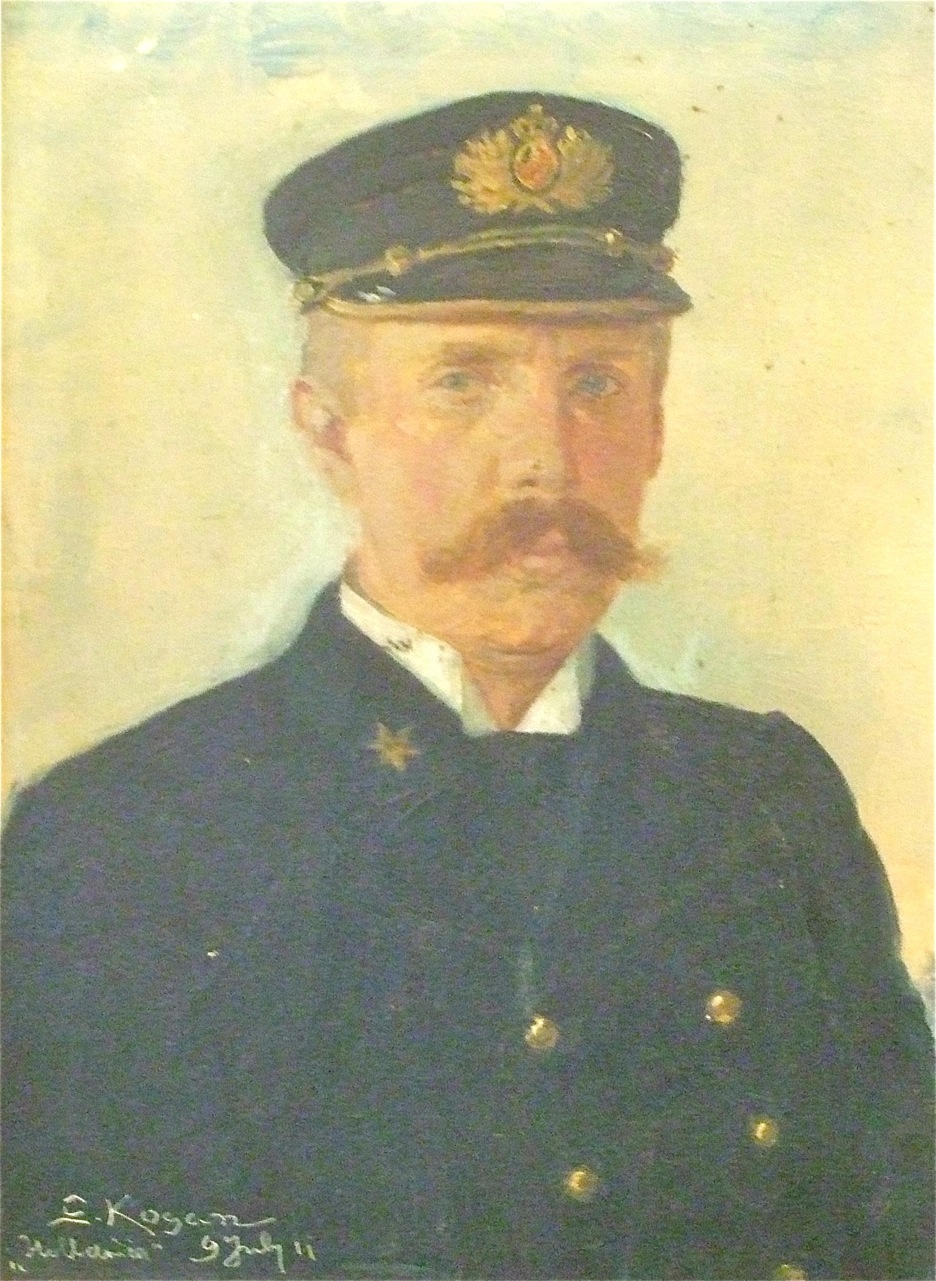
Captain Jan Schottee de Vries. This painting shows him in command of the ss Hollandia in 1911 (a)
As far as I know not much archive of the Lloyd has survived and thus we have to rely on newspapers for tracing his career. By now the Dutch board of Inquiry for Shipping had been established and as was the case with most seafarers also Capt. Schottee pops up in the proceedings. The first time in December 1908 when still in command of the ss Amstelland. After departure from Buenos Aires on 31 July 1908 a fire broke out on board which caused great panic among the Portuguese and Spanish passengers. Some of them decided to lower a lifeboat all by themselves and were later towed back to the Amstelland by an English steamship the ss Imogen. The fire on board the ss Amstelland had been extinguished by that time. During the lowering process 6 passengers had drowned. Captain Schottee was commended for the fire fighting by his crew but was admonished by the Board for not keeping order among the passengers but he was not held responsible for the drowning of the six. The fire had most likely been caused by a smoking stowaway which partly burned body had been found in the tween deck area. Common with the language of those days, “the nigger had not been known to anybody to be on board and thus must have been a stowaway”. The Captain was acquitted as he could not be held responsible for the fire or the drowning of the passengers.
What is peculiar in this case is that the Board keeps the captain responsible for law and order on board but ignores the fact that the Law of that time hardly gave any compulsory rules to follow inregards to Boatdrills and related safety for the passengers on board. That only came after the Titanic.
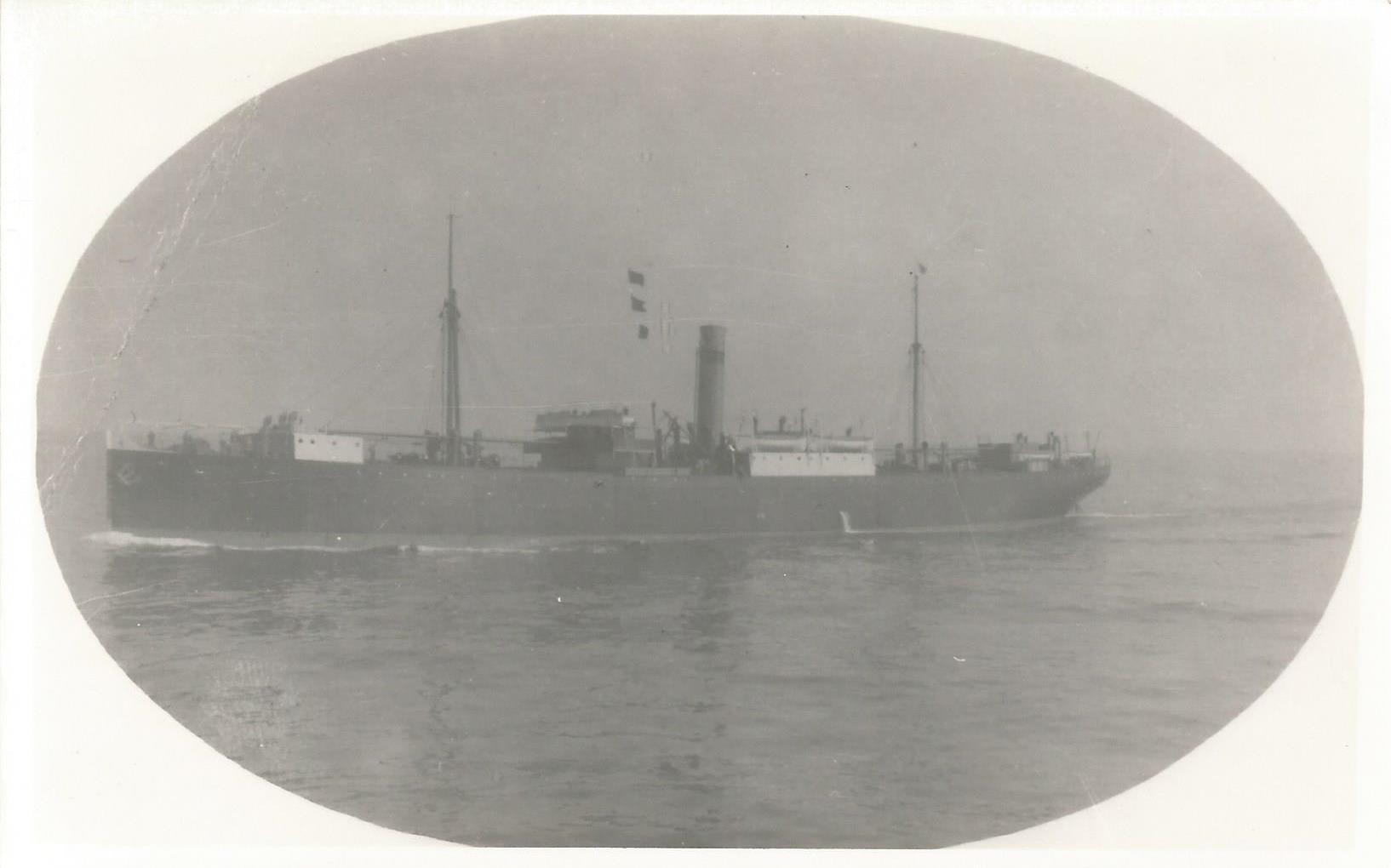
The ss Amstelland of the Royal Holland Lloyd. (b)
Then he has again to face the Board in 1910. Now in command of the brand new ss Hollandia. His ship had a collision on the 12th. of August 1910 after leaving Amsterdam and calling at Boulogne Sur Mer. While sailing southwards it collided with the German flagged ship ss Sparta in thick fog. A faint fog signal was heard on the port side of the Hollandia and the officer on watch decides to stop the ship and call the captain. Some time later a bow wave was seen on the port side (often fog hangs above water and you can see the sea but not higher up) and the order “ full astern” was given. The signal for going astern (3 short blasts on the whistle) was given and the other ship did the same but they still collided. The bow of the ss Hollandia was hit. The ss Sparta sailed on but arrived in a sinking condition at Weymouth England. The Hollandia sailed to Southampton for repairs. During the Inquiry the crew of the ss Sparta was not present but had given statements. After reconstruction of the most likely course, speeds and orders, and scrutinising various statements, The Board decided that all fault lay with the ss Sparta and Captain Schottee was acquitted once again.
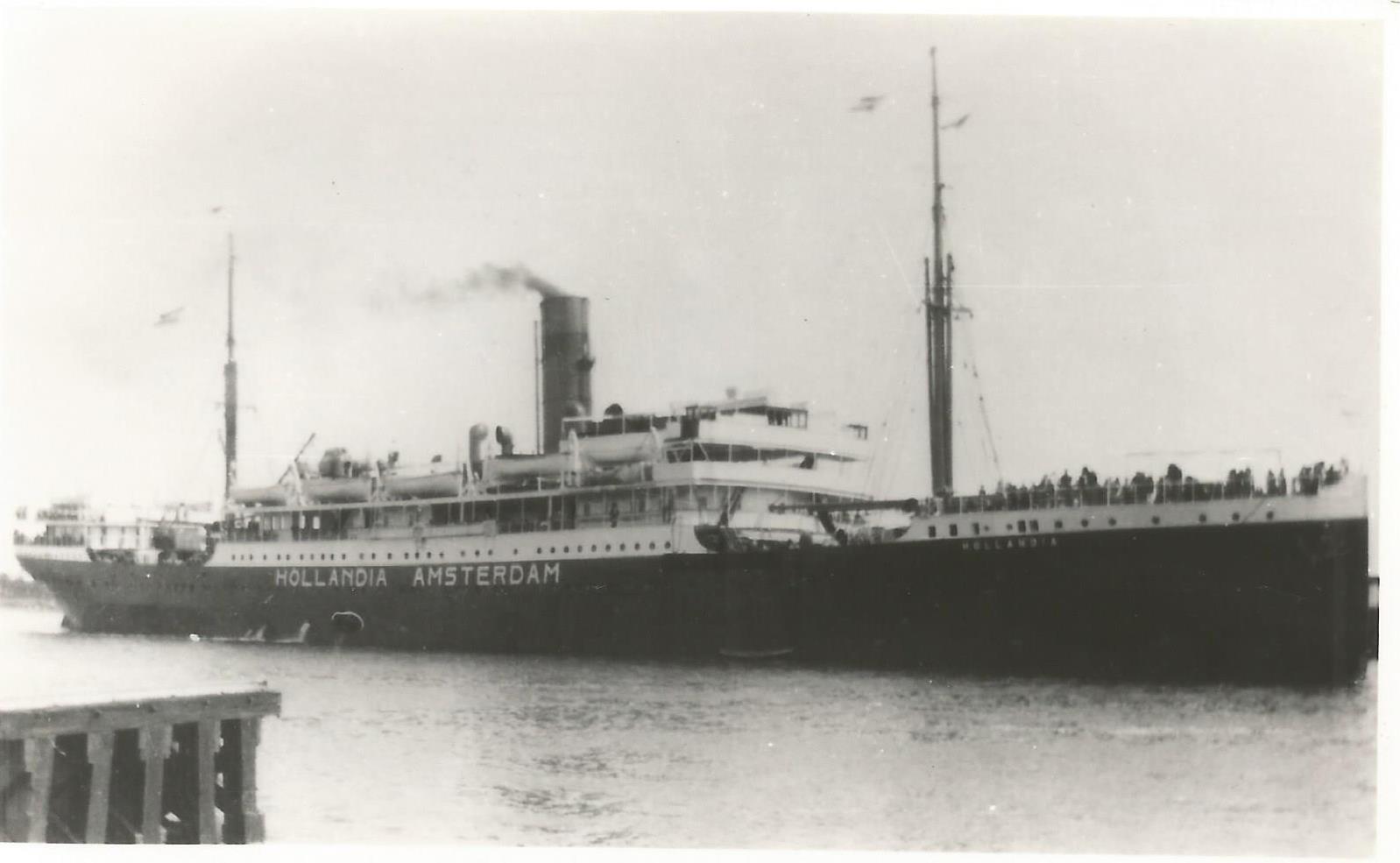
The ss Hollandia of the Royal Holland Lloyd. She was a brand new ship in 1910. here she is seen during the first World War with the neutral lettering on the side to advise submarines not to shout as it is a ship of Neutral Flag Status. (b)
In February 1911 he is back again before the Board but now as a witness, due to a boiler explosion on board the ss Hollandia. And he cannot help the inquiry with much more than declaring that he heard a “boom” and then went to the bridge, waiting for the advice of the Chief Engineer.
Then sometime after he goes shore side and is appointed as Inspector for the Royal Dutch Lloyd which job includes visiting all the ships to see of the company standards are adhered to.
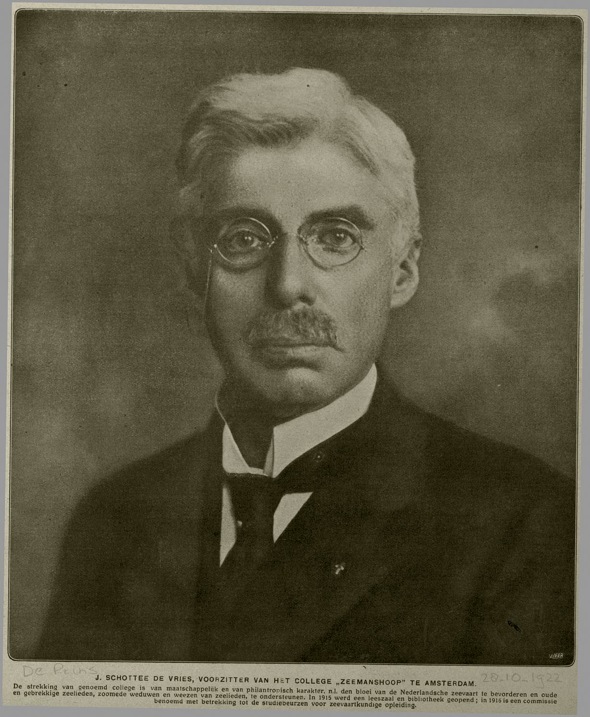
Captain Schottee in later life. This picture was taking from a Dutch Illustrated magazine called “De Prins” on 28 October 1922 (a)
Apart from sailing: on 07 December 1911 he joined (Pennant nbr 966) the Amsterdam Seaman’s brother hood called College “Zeemanshoop” which still exists. Nowadays it is very active in supporting teachers to join Maritime Academy’s and to further Nautical Science in General. In the days of Captain Schottee its function was to further the progress of Dutch Seafaring, to support disabled sailors, as well as widow and orphans of sailors. In 1915 a reading room and library was opened and in 1916 funds were made available for those who would like to study nautical science. Captain Schottee joins the board of the College in 1912 and remains a member until 1932. Around 1928 he was chairman of the College. (b,c)
By 1922 he is retired, he does not leave the sea behind but remains active in several support organisations. As already mentioned he was and remained a member of the committee of “College Zeemanshoop” and is noted as its chairman in 1922. In 1922 he is mentioned as member of the commission for the examination of the “Mates” or Deck Officers. Which will have included looking after the proper examination of the pupils of his own School from 1879. In the listing of 1929 in the newspapers, he is part of it. In 1931 he is mentioned as a member of the financial committee of the Dutch Society of the “Koninlijke Nederlandse Vereniging “Onze Vloot”” (Royal Dutch Society “Our Fleet”. Which aim it was to bring and keep the Dutch Mercantile Fleet in the spotlight.
Born in Hoorn, in the northern part of the west side of Holland, he lived for most of his life in Amsterdam but settled down (after his retirement ?) in Bussum to the South East of Amsterdam. Most of his children where living there as well and here he passed away on 11 September 1937.
An interesting item is a small postcard send to the captain on 06 Sep. 1893 from a certain Bertha Craig. She acknowledges receipt of receiving a parcel, which we assume he brought over with the ship. On this voyage the Didam arrived on 31 August in New York and sailed again on the 7th., thus this postcard was written (and most likely delivered the same day if written in the morning) the day before sailing.
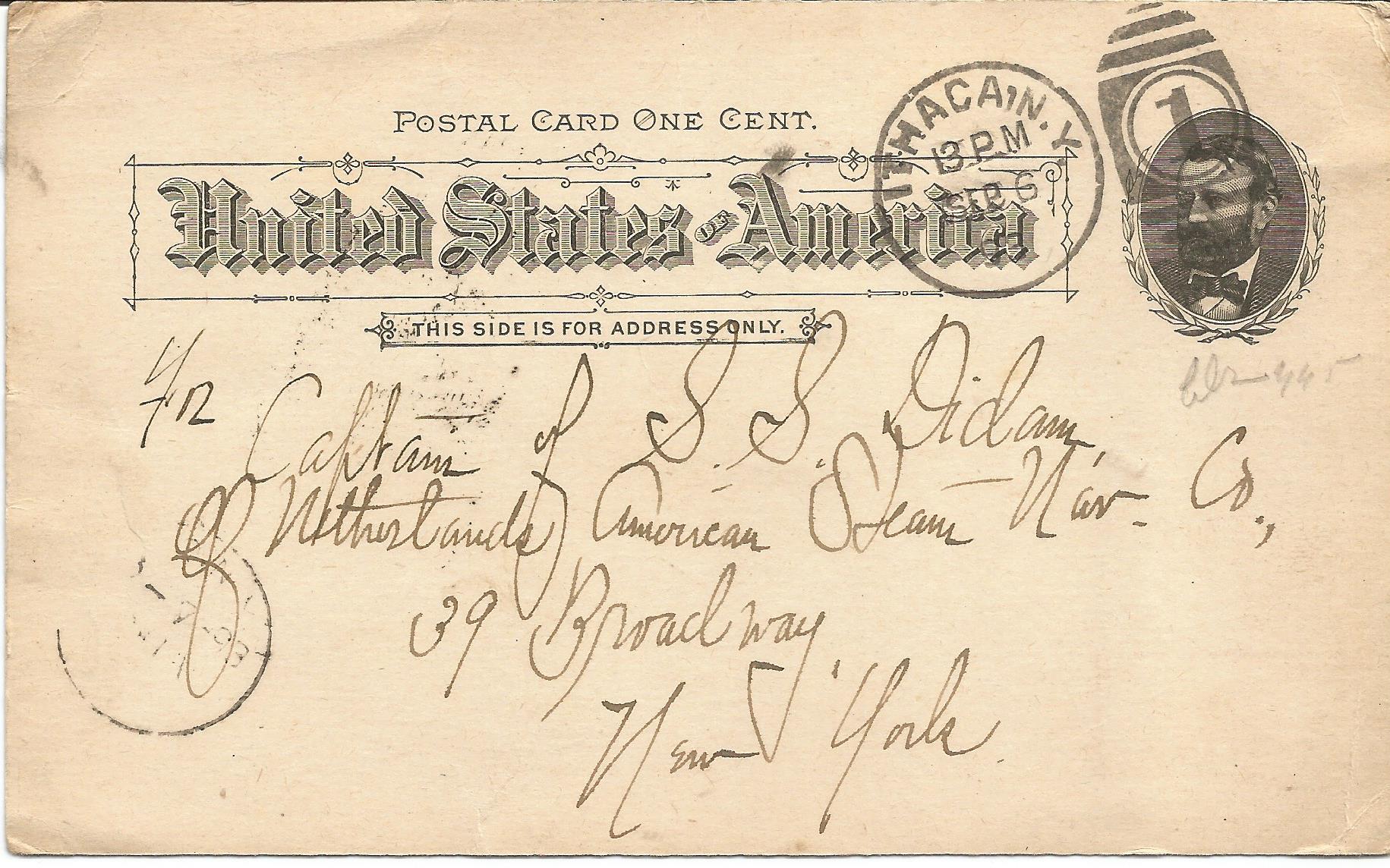
Post card sent to Captain Schottee de Vries. What nowadays would be done by email was done in those days by postcards. (Courtesy Tiemen Spits)
Sailing Listing:
Date: Function: Ship: Wages and/or remarks.
25 Jan. 1887 3rd Officer Schiedam fl 40,–
15 Dec. 1887 2nd Officer Edam fl 60,–
01 Nov. 1888 Chief Officer Edam fl 100,–
06 Mar. 1890 Chief Officer Maasdam 100,– (voyage 1)
31 May. 1890 Wage increase to 110,–
20 Jul. 1890 Chief Officer P. Caland 110,–
01 Sep. 1890 Act. Captain P.Caland 110,–
21 Oct. 1890 Captain P.Caland 200,- Definite
22 Mar. 1893 Captain Didam
10 Jul. 1894 Captain P.Caland
28 Jan. 1895 Act. Chief Officer Maasdam
18 May. 1895 Captain Schiedam
23 Sep. 1896 Temporary dismissed scheduled for the Zaandam. Left on 23 September with the ss Amsterdam as passenger to New York to take command of the ss Zaandam.
07 Oct. 1896 Captain Zaandam
Xx Jun. 1897 Due to sale Zaandam temporary ashore
30 Aug. 1897 Captain Obdam
07 Oct. 1897 Captain Werkendam
26 Oct. 1898 Dismissed and put on standby
01 Dec. 1898 Captain Edam
08 Aug. 1899 Captain Amsterdam
12 Sep. 1899 Dismissed and put on standby
14 May. 1900 Dismissed on own request.
Transfers to the Kon. Hollandsche Lloyd. (Royal Dutch Lloyd) of Amsterdam.
1900 – 1908 Captain Amstelland South America service.
1908 (*) – ???? Captain Hollandia South America service
(*) some sources give 1910.
Photo Credits:
(a) Unkown family member
(b) Authors collection
(c) Mr. E.H Kruidhof

June 13, 2021 at 9:51 am
(a) is known to me. A very, very distance family member.
December 28, 2023 at 10:48 am
2023-dec:
This Jan Schottee de Vries was the captain on board of the SS Amstelland were the great-grandfather (in 1909) of my wife emigrated to Brasil. And 11 years later they came back to the Netherlands. A complete disaster were those 11 years.
But 4 of the children stayed in Brasil. And with the descendants of those we have contact by finding them in the family tree.
And now I have found the passenders list with the names of the family and the captain of the boat !
I found this information on the passenger list of departure at 18 Sep. 1909 from the Netherlands to Brasil, Rio de Janeiro.
Wunderful to find this sort of information . . . .